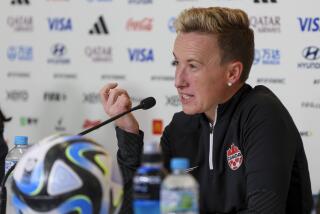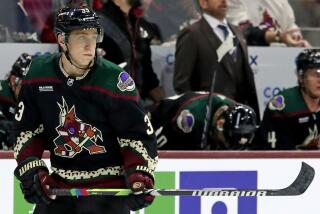Norstrom Feels Heat in Sweden for Drug Test Refusal
- Share via
As a defenseman for the Kings and member of his country’s teams in Olympic and world championship competition, Mattias Norstrom is a hero in Sweden. He’s used to seeing his picture in newspapers in Stockholm.
But not like this.
Not reading that his future in international play, and those of Edmonton goalie Tommy Salo and Toronto rookie Mikael Hakansson, are in doubt.
On Aug. 7, while Norstrom, Salo and other NHL players were working out at a rink they rented in Stockholm, three representatives of the Swedish sports federation (RF) approached them with demands for immediate urine tests. The players refused, and a miffed member of the federation--the equivalent of the USOC--said they could be disqualified from international teams for two years.
Said it in a press release actually, that Swedish newspapers picked up on.
“You feel like you have to defend yourself, and you haven’t done anything wrong,” Norstrom said Friday.
Here’s why.
The NHL and NHL Players Assn. had an agreement with the International Ice Hockey Federation before the Nagano Olympics that there would be no drug testing of players until they were identified as members of their country’s Olympic team. The NHL agreed only a few weeks ago to allow its players to participate at Salt Lake City in 2002, and a new agreement will be worked out in the next few months. Until then, the old deal is considered binding.
The agreement is an offshoot of the collective bargaining agreement between the NHL and NHLPA that does not call for random drug testing.
Norstrom, who wants to play for Sweden in Salt Lake City, is not on his country’s Olympic team.
No one is. The Games are too far away.
The Swedish Ice Hockey Federation, as a member of the IIHF, is a party to the agreement, but the federation wasn’t consulted by the RF, which was acting unilaterally.
But the NHLPA was consulted by the players after they refused to take the tests.
“They were right not to take the test,” union spokesman Tim Wharnfby said.
Bill Daly, the NHL’s executive vice president and chief legal officer, agreed.
“They wouldn’t know what control there was in that situation,” Daly said. “Who was administering the test?”
What were the testers seeking? Who was doing the test? What was the appeal process?
All those questions came into play. None was answered.
“These players are not on an Olympic team, and they were not preparing for an Olympic event or competing on any international level,” Salo’s agent, Rich Winter, told the Edmonton Sun. “They were just a bunch of friends having a practice and shooting the breeze, when out of the blue somebody shows up and [asks for urine samples].
“They didn’t even know who these guys were. For all they knew, they could have been the Swedish equivalent of the National Enquirer looking for a story.”
Said Daly, “They were right in refusing.”
Not according to the Stockholm press.
“After they learned about the agreement [among the NHL, NHLPA and IIHF], they ran big pictures and big headlines and asked, ‘What is the NHL hiding?’ ” Norstrom said. “We weren’t hiding anything.
“We just didn’t want to be a pilot test [for the agreement]. Other countries, Czech [Republic], Finland, Slovakia, they knew about the procedure. Why not Sweden?”
Or why didn’t the Swedish sports federation talk with the Swedish Ice Hockey Federation before sending testers?
The questions were posed by the players. None was answered.
Then another scenario was offered.
“We told them we wouldn’t be tested as a group, but we would be tested as individuals,” Norstrom said. “If they want to use those tests and show kids that you can succeed without taking drugs, we have no problem with that. It’s a good thing.
“But not this way.”
Since the incident, stories from Sweden and on the Internet have appeared, some true, others not.
For example, one report said the NHLPA had agreed to let the players be tested as long as the results were sealed until it was determined whether they were going to be 2002 Olympians.
“Absolutely untrue,” said Wharnfby, speaking for the union.
They have still not been tested. After the Kings were swept by Detroit in the playoffs, Norstrom played for Sweden in the World Championships in St. Petersburg, Russia, where all players were subject to random drug testing.
“I have nothing to hide,” Salo told the Edmonton Journal. “I’ve given many samples before, even during the Olympics in Nagano.”
Added Norstrom: “When I played in Nagano in ‘98, I was tested. . . . “
He has been a member of Swedish national teams in six international competitions, each time subject to drug testing, each time passing without a problem.
“We got caught in the middle,” said Norstrom. “This is a pain to have to deal with in the summer.”
He no longer has to. Daly said the league, the union and international hockey people in Sweden and elsewhere have fired messages back and forth for three weeks now to address the problem.
More to Read
Go beyond the scoreboard
Get the latest on L.A.'s teams in the daily Sports Report newsletter.
You may occasionally receive promotional content from the Los Angeles Times.






